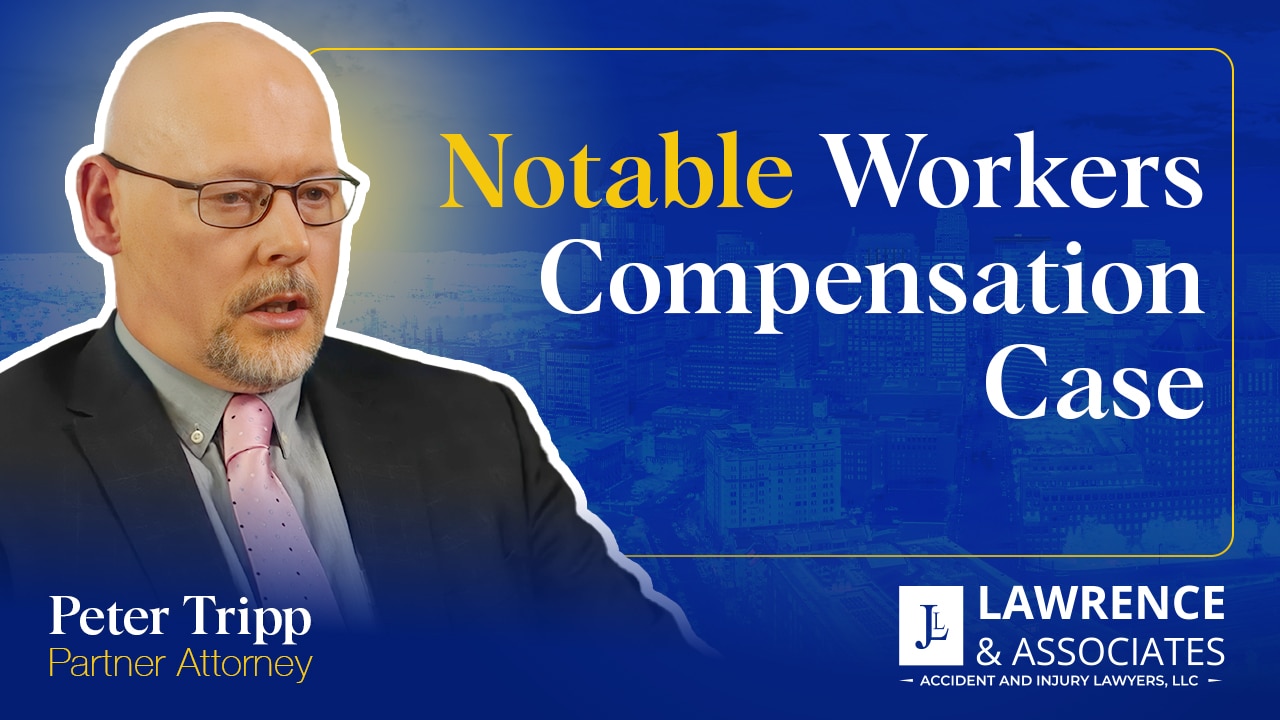Workers CompensationLawyers In Cincinnati & Northern Kentucky
A work injury can lead to high stress as you navigate workers’ comp, medical bills, and recovery. At Lawrence & Associates, our team is committed to helping injured workers obtain the compensation they deserve through a thorough and effective claim process.
If you have been hurt on the job, do not hesitate to seek legal support. Contact our law office today to schedule a free initial consultation.
Home > Workers’ Compensation Lawyers in Cincinnati
content reviewed by:
Justin Lee Lawrence
table of contents
- Why Hire Lawrence & Associates Accident and Injury Lawyers, LLC To Handle My Case?
- Our Successful Workers' Compensation Results
- Workers’ Compensation Cases We Handle
- What Is Workers’ Compensation and Who Qualifies?
- What Benefits Can You Receive Through Workers’ Compensation?
- What Are Common Challenges in Workers’ Comp Cases?
- How Our Workers' Compensation Lawyers Can Help
- Get Help With Your Workers’ Compensation Claim From Lawrence & Associates
- Frequently Asked Questions
Why Hire Lawrence & Associates Accident and Injury Lawyers, LLC To Handle My Case?
When you choose to partner with Lawrence & Associates, you secure a team dedicated to the success of your case. We are local, trusted, and focused on helping working families. Our offices are located in Cincinnati and Fort Mitchell, giving our clients easy access to us.
As an added benefit, we offer free consultations and no fees unless you win, ensuring financial barriers do not keep you from considering us. We also provide Spanish-speaking support to further expand our reach.


Justin Lawrence
Founding Partner
“The workers’ compensation carrier doesn’t think of an injured worker as a person. From day one, they look to limit their financial exposure. The statute and regulations are riddled with exceptions that are traps for the unwary practitioner. There is no substitute for experience when navigating a workers’ compensation case.”
Our Successful Workers' Compensation Results
A man was injured when a piece of construction equipment collided with his vehicle and crushed him.
A man was working on a motor vehicle when a truck struck the vehicle.
A man fell off a ladder at work and shattered his knee his insurance refused to pay for lost wages.
Our client tragically lost their life in a catastrophic accident. We were able to secure full compensation for their family, providing support during an incredibly difficult time.
Workers’ Compensation Cases We Handle
Our experienced legal team has offered support to many people seeking assistance with workers’ compensation over the years. Our experience has given us the ability to hone in on our clients’ needs based on their unique situation. Key to filing workers’ comp in Ohio: Know your employer’s coverage. Regarding workers’ compensation, employers in Ohio are either:
- Self-insured —These employers will directly pay employees who are granted workers’ compensation benefits.
- State-fund — State-fund employers pay regular insurance premiums to the Ohio Bureau of Workers’ Compensation. When someone files a claim, the BWC makes the payment instead of the employer.
- Private Insurance Carrier — In Kentucky, most employers purchase private workers’ compensation insurance on the open market. Making a claim with these carriers is more like making a claim with the automobile insurance of a negligent driver. They represent the other side in the injury, and generally act accordingly.
If you aren’t sure whether your employer participates in state-fund, workers comp benefits, or self-insured workers’ compensation, ask. Your employer can guide you on reporting and seeking medical care after a workplace injury. Make sure you collect the necessary information from your human resources department and follow the specific procedures. Your workers’ compensation benefits, depending on your specific injury or illness, will cover the following:
- Medical Costs — This often includes emergency care, doctors’ appointments, ongoing treatment, and prescriptions.
- Lost Wages — Depending on the severity of your condition, the amount of compensation provided by workers’ compensation will differ. Your injury or illness will be classified as either permanent partial disability, temporary total disability, or permanent total disability.
Based on your condition, a lawyer can ensure that you receive a fair and helpful amount for your situation.

What Is Workers’ Compensation and Who Qualifies?
Workers’ compensation is a state-mandated system that provides benefits to employees with job-related injuries or illnesses, including medical care, wage replacement, and rehab. It can apply to both full-time and part-time employees.
To qualify, the injury or illness must be work-related, either caused by your job duties or occurring while you are on the job. Examples of qualifying injuries and illnesses include the following:
- Slips and falls on the job site
- Injuries from machinery or equipment
- Repetitive strain injuries, like carpal tunnel syndrome
- Exposure to toxic chemicals or substances
- Hearing loss from loud work environments
- Burns or electric shocks
- Work-related vehicle accidents
- Back or neck injuries from lifting or overexertion
- Psychological trauma from a specific work incident, in some cases
Work-related traumatic events can also lead to workers’ compensation claims, including those involving transportation or aviation workers. For example, incidents like the UPS plane crash in Louisville highlight how catastrophic workplace accidents can be and how complex the claims process may become for affected employees.
In most cases, you don’t have to prove the employer was at fault — but you must show the injury arose out of and in the course of employment and report it promptly under the applicable rules.
Types of Disability
There are various types of disability, including temporary total disability, permanent partial disability, permanent total disability, and temporary partial disability.
- Temporary Total Disability – You are entirely unable to work for a limited period due to a work-related injury or illness, but you are expected to recover. Benefits for this type of disability include partial wage replacement during recovery. It ends when you return to work or reach maximum medical improvement (MMI).
- Permanent Partial Disability – You have a lasting disability, but you can still work in some capacity, though possibly not at full strength or in your previous role. The benefits for permanent partial disability are often paid as a scheduled award or lump sum, based on an impairment rating.
- Permanent Total Disability – You are unable to return to any kind of gainful employment due to a severe, permanent work-related injury. This could include a severe brain injury, complete paralysis, and multiple amputations. The primary benefit for permanent total disability is lifetime wage replacements; however, eligibility requires medical evidence and vocational assessment.
- Temporary Partial Disability – You can return to work part-time or in a limited capacity, earning less than you did before the injury, temporarily. Benefits include partial wage replacement for the income difference, and they typically end when the worker returns to full duty or reaches MMI.
What Benefits Can You Receive Through Workers’ Compensation?
A successful workers’ compensation case can result in several forms of compensation, including the following:
- Medical expenses – Surgeries, doctor’s appointments, prescriptions, and ambulance fees
- Wage loss – The amount and extent of coverage depends on the type of disability you are confirmed to have—typically TTD, PPD, or PTD, depending on medical proof.
- Vocational rehab – If you cannot return to your previous job, you may receive help to get back into the workforce
- Mileage reimbursement or medical travel
- Death benefits – Coverage for wrongful deaths at a jobsite or as a result of a work injury
- Scheduled loss awards – A lump-sum payment for specific, permanent losses such as amputation, loss of vision or hearing, and loss of function in a limb
What Are Common Challenges in Workers’ Comp Cases?
Navigating the workers’ comp claim process can come with barriers you must overcome. The most common of these challenges include the following:
- Denied claims – Workers may face denied claims if the employer or insurer disputes that the injury is work-related or questions when and how it was reported.
- Delays in payment or treatment approval – Delays can occur when insurers take too long to authorize medical treatment or issue wage replacement checks, causing financial and health setbacks.
- Retaliation by the employer – Some injured workers experience retaliation, such as reduced hours or termination, after filing a workers’ compensation claim.
- Forced return to work before recovery – Employers or insurers may pressure employees to return to work before they have fully healed, risking further injury.
- Doctor conflicts or independent medical exams (IMEs) – Conflicts may arise when the employer’s doctor or IME provides a report that contradicts the worker’s treating physician, affecting benefits eligibility.
- Disputes over permanent impairment rating – Workers often face disputes over the percentage of permanent disability assigned, which directly impacts the amount of compensation awarded.
If any of this happens while navigating your workers’ comp claim, call us. We’ll protect your rights, push for timely approvals and payments, and keep you informed—that’s part of our Client Bill of Rights.
How Our Workers' Compensation Lawyers Can Help
Our seasoned team of workers’ comp attorneys in Cincinnati and Northern Kentucky can support your claim through numerous means:
- Application and appeals support
- Gathering medical evidence and expert opinions
- Handling hearings and negotiations
- Protecting against retaliation
- Ensuring full compensation and benefit access
We have in-depth experience with Ohio BWC and Kentucky’s DWC systems and can navigate your case with ease. Review our case results page today to learn more about our past successes.
Get Help With Your Workers’ Compensation Claim From Lawrence & Associates
Walking through a workers’ compensation claim can be overwhelming, especially when you are focused on healing. If you need help with your claim, contact Lawrence & Associates for a free consultation today.
We are committed to fighting for fair compensation for residents of Cincinnati and Northern Kentucky. Schedule a meeting with our experienced workers’ compensation lawyers in Cincinnati and Northern Kentucky to get the support you deserve.
Our compassionate and experienced trial attorneys are here to give you a measure of justice and financial relief for what you’ve been through.
Frequently Asked Questions
How Long Do I Have To File a Workers’ Comp Claim in Ohio or Kentucky?
In Ohio, you generally have one year from the date of your injury to file a workers’ compensation claim. In Kentucky, you typically have two years from the date of injury or last voluntary payment of benefits, whichever is later.
Can I See My Own Doctor for a Work Injury?
In Ohio, you must choose a doctor certified by the Bureau of Workers’ Compensation after the first visit. In Kentucky, you are allowed to select your own treating physician, but the choice must be made from a list of approved providers in most cases.
What Happens if My Workers’ Comp Claim Is Denied?
If your claim is denied, you have the right to appeal the decision within a specific timeframe, 14 days in Ohio and 30 days in Kentucky. During the appeals process, additional evidence may be presented to support your case.
Do I Need a Lawyer for a Workers’ Comp Case?
While not required, having a workers’ comp attorney can significantly improve your chances of getting fair benefits, especially if your claim is denied or involves complex issues. Legal guidance ensures your rights are protected throughout the process.
"*" indicates required fields
case results
$4M
SETTLEMENT
A man was injured when a piece of construction equipment collided with his vehicle and crushed him.
$3.5M
SETTLEMENT
A man was working on a motor vehicle when a truck struck the vehicle.
$1.2M
SETTLEMENT
A man fell off a ladder at work and shattered his knee his insurance refused to pay for lost wages.